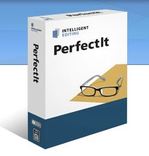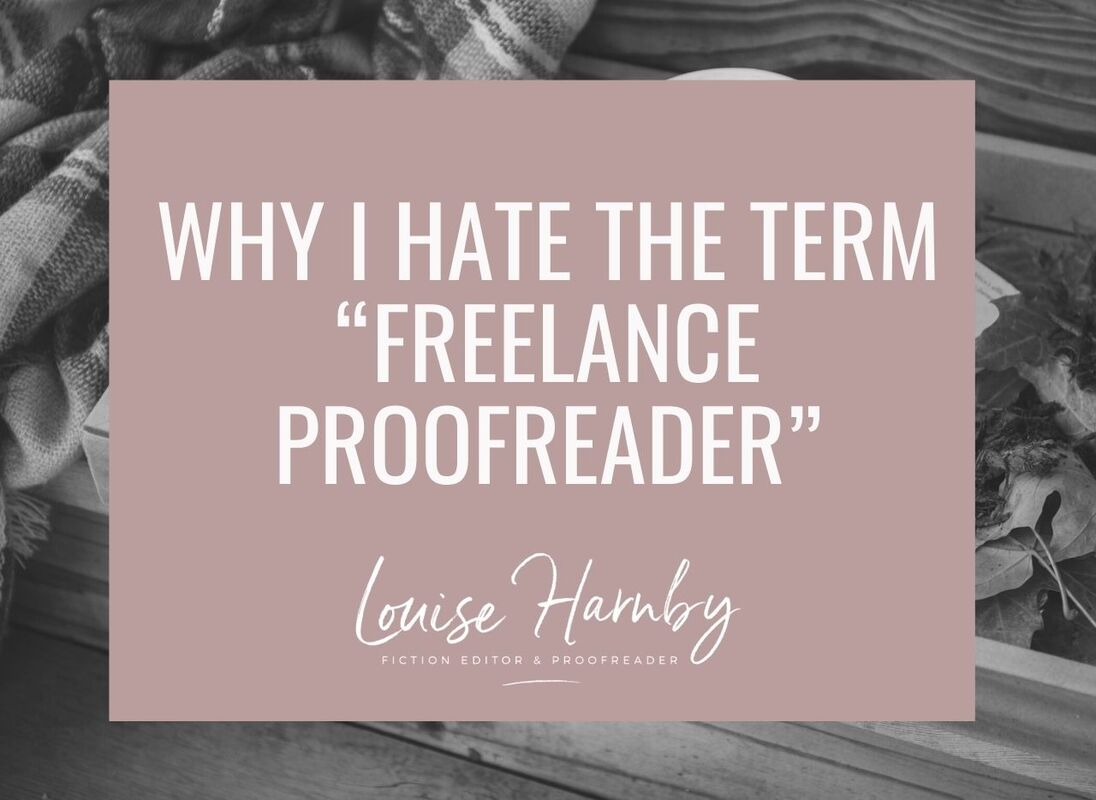
With the release of version 2 of PerfectIt, it seemed the ideal time to put some questions to Daniel Heuman, managing director of Intelligent Editing. I've been a PerfectIt user for some years and I'm looking forward to upgrading to the new version.
Visit the Intelligent Editing website for more information about PerfectIt. You might also like the PerfectIt User Forum, where you can ask questions, suggest improvements and download style sheets. In the meantime, if you're open to complementing your editorial eye with useful ancillary tools, and want to learn a little more from the developer, read on ... 
Louise Harnby: For the benefit of those who’ve never used PerfectIt, Daniel, tell us a bit about what it does.
Daniel Heuman: PerfectIt is a consistency checker. Just as you have a spell checker for spelling, and a grammar checker for grammar, PerfectIt checks documents for consistency mistakes. For example, if you hyphenate "copy-editor" in one location in a document, it’s important to make sure that’s consistent throughout. So PerfectIt checks consistency of hyphenation, capitalization, abbreviations, numerals in sentences, list punctuation and many other things. PerfectIt also helps check points of style. PerfectIt can be customized with house style preferences and used to check those. For example, one editor programmed PerfectIt to check WHO (World Health Organization) style and made that available to all users. Anyone wanting to check WHO style can just load up that stylesheet and PerfectIt will check for over 1600 preferences. From "hyponatraemia" (not "hyponatremia") to "corrigenda" (not "corrigendums"), that’s an invaluable resource to anyone working with the style. Finally, PerfectIt helps tidy up documents. It checks that abbreviations are defined, that users haven’t left notes to themselves in text (e.g. "NB: insert figure here") and it can create a table of abbreviations (automatically locating all abbreviations and their definitions) in seconds. LH: I was discussing all things business to a friend of mine who’s a marketing manager. He writes a lot of quite lengthy reports for internal and external use. I suggested PerfectIt to him and his response was: "I don’t see the need for something like that – there’s a spell check on my PC and I’ve got a good eye.” What would you say to him? DH: I’d probably scream “oh-my-god-you-are-wasting-your-life!” Actually, that’s not true … I’m English, so I’d probably roll my eyes and walk away! The truth is that there are two reasons why he should be using PerfectIt. The first is speed. How long does it take him to find one inconsistency? He needs to read through his entire text, locate each word that is capitalized and check/remember to capitalize that word throughout. Then he needs to do the same for hyphenation, abbreviations, heading case, and so much more. PerfectIt finds all of that in seconds. He really is wasting his life by doing it the long way. The second reason for him to switch to PerfectIt is quality. PerfectIt helps users to really take pride in their work. It isn’t possible for the human brain to keep track of consistency once documents pass several thousand words. Some 80% of documents over 1000 words that are published online contain a capitalization inconsistency, and over 60% contain a hyphenation inconsistency (see The Top 10 Consistency Mistakes). Even if we restrict it to spelling, over 20% of documents over 1000 words that are published online contain a spelling inconsistency. There’s nothing a spell checker can do about that last category. The word "adviser" and "advisor" are both correct spellings. But if they appear in the same document, that’s an inconsistency. Some people won’t ever be convinced. But the stats are real. And as soon as they try PerfectIt, they get it. LH: So PerfectIt’s not just for editors or proofreaders. It feels like you developed it with a much broader audience in mind … DH: My background is in economics, and I started out as an economic consultant. Most of the tests that PerfectIt carries out are based on real world experience at that time. For example, we’d deliver reports for businesses and government, but at the end of each report we’d have to go through carefully and make sure that bullets were consistently capitalized and punctuated. We’d check that abbreviations were defined in their first instance, and that they were only defined once. So PerfectIt was designed very much for that market, with a focus on consultants, engineers, lawyers, and medical professionals. It was only when PerfectIt was released that it was adopted by the editing community, translators and technical writers. In terms of overall revenue, the big companies are probably more significant. But in terms of volume, it’s the individual editors who have been most important. I stopped counting sales to members of the Society for Editors and Proofreaders after it reached 100. And the success is similar with other editing societies around the world. But it’s not just about volume. Editors are wonderful customers because they send feedback. Is there any group in the world better at spotting flaws in editing software? You better believe I get a lot emails with examples that PerfectIt has missed. The result is that we’re always improving the product based on the mails we get. LH: I’ve been pleased to see that you email me and your other customers with updates every now and then. Can you tell us about the driving factors behind these updates? And if f I say to you, “I’d really like it if PerfectIt did X or Y”, might I expect to see my suggestion in future versions? DH: Yes, we can’t include all suggestions, but we have a place on our user forum where customers can bounce around feedback for future versions. For the first three years, those updates have all been free. And the ones suggested by users include support for multiple style guides, and the system for dealing with tracked changes in documents. After three years, PerfectIt 2.0 will be the first major version upgrade that users will have to pay for. PerfectIt has a permanent licence (no subscription fee or anything like that), so in order to justify people spending more money on it, we’ve had to load PerfectIt 2 with user requests and lots of other new features. In particular, we’ve added a "Back" button (possibly the most requested feature) and a system for generating reports on errors and on changes made, which is probably the second most requested feature. LH: And what are the biggest challenges you’ve faced during development? DH: The constant challenge is to choose between complexity and usability. The more features and tests we add to the product, the more complex it becomes. But what people love about PerfectIt is the ease of use. So we’re constantly trying to balance those two. With any new feature, the first question is: "Can we get the software to do that?" But the second question is: "Will it be easy for the user to understand?" LH: Does PerfectIt work for customers outside the UK? Some of the North American or Pacific Rim readers may be wondering if they can use it. DH: PerfectIt is international. It doesn't duplicate the functions of a spelling checker, but it will spot inconsistencies in language. So, for example, it won't correct "realise" or "realize". However, if "realise" and "realize" appear in the same document, that’s a consistency mistake. Whether you’re in Europe, North America or the Pacific Rim, a consistency mistake is still a consistency mistake. LH: People are often concerned about buying software and then finding out that it doesn’t do what they hoped. Can you try it before you buy it? DH: There is a free download on the website. Users can try it without giving any credit card details or other personal information. Just download it and run it on a document. When they try it, most people get what the product is about in seconds. The only suggestion we make is that PerfectIt is intended for longer documents. There’s no point in trying it out on a paragraph of text because that won’t contain many inconsistencies. Try PerfectIt on a document that’s over 1,000 words. Or better yet, try it on a document that’s over 10,000 words. That’ll show you what it can do. LH: What does the future look like at Intelligent Editing? Do you have any plans for additional software tools or plug-ins? PerfectIt 2 took an enormous amount of development time and effort, so it might be a while before we start anything new. However, there are a few projects under consideration, so we’ll let you know when we’ve decided. LH: I often post on this blog about my favourite editorial tools. Aside, of course, from PerfectIt, what are your favourite tools and resources? Anything you like … software, books, online resources and social media. DH: My favourite free tool for writing and editing is ClipX. It modifies the clipboard so that it shows the last 25 items that were copied, no matter what program they were copied in. After using it, I can’t understand why anyone would choose to work without it. It’s more for writing than for editing, but I think that Word’s "AutoCorrect" feature is underrated. Why write out the word ‘"necessary" when you can program AutoCorrect to spell the word in full when you type ‘"nry"? You can quickly build yourself up an entire vocabulary and save lots of time typing. I’m also a really big fan of Jack Lyon’s Editorium macros. Jack has put a lot of thought into the documentation, and the result is a system that helps you to work a lot faster. People don’t believe that faster keystrokes and saving a second or two each time can make a difference. But they really do. LH: And finally, tell us something that might surprise us! DH: In my other life, I’m a swing dancer. That’s partner dancing to big band jazz and old-time blues … and nothing at all to do with editing!
0 Comments
An open letter to new proofreaders (in fact, editors of all descriptions) ...
Dear newbie proofreader,
I’ve told you a lie – I don’t hate the term “freelance proofreader”. “I’m freelance”, “I went freelance in …”, and “since I’ve been freelancing” are phrases I trot out all the time to explain the way I organize my work life. I'll be frank with you, though – I do sometimes worry that the term “freelance” doesn’t quite cut the mustard. If I’d spent 15 years working as an electrician for an electrical installations company and then decided to go it alone, I’d never have described myself as a "freelance electrician". I’d have told people that I was now running my own electrical business. Does “freelancer” really reflect the level of business acumen required to do my job? And it’s not just my ability to make sound judgements and take the right decisions. It’s bigger than that – it’s that whole sense of business-cultural embeddedness that’s at stake. If I don’t think of myself as a business owner, then am I in danger of not acting like one? And if I don’t act like one, why would anyone else think to treat me as one? Her Majesty's Revenue and Customs does not consider me a “freelancer”. Rather, I’m a sole trader. I’m the owner of a business that employs exactly one person. I carry out tax self-assessment on an annual basis just as if I was that business-owning electrician I mentioned above. Just like the electrician, I’m hired by a number of different clients to carry out professional services. Just like the electrician, I set my own rates (though perhaps unlike our electrician I may agree to – or decline – an offered fee). Just like the electrician, it’s up to me to decide whether I want to accept a client’s offer of work or decline it. Just like the electrician, I work the hours I choose to work and take holiday leave when I decide to. And just like the electrician, the only person who can fire me is, well, me. Does a freelancer work in a different way to that of a business owner? This one doesn’t. So what’s the problem with referring to myself as “freelance”? I don’t think there is one as long as I’m clear in my mind about what needs to be done – and being a business owner is more than just a being a proofreader (or an electrician).
I could say more but I have a work deadline to meet and a child who's complaining of a sore throat, so there isn’t time right now. I hope this gets you thinking, anyway. So, dear newbie, if in your own head the term “freelance” doesn’t conjure up an image of these many hats, then I’d advise you instead to start thinking of yourself as a business owner first and foremost. To do otherwise may leave you ill-prepared for the myriad functions that you’ll need to perform (and that you may have little experience of) when you start out. You'll be the luckiest editorial freelancer in the world if the work just lands in your lap. It's far more likely that you'll have to work very hard to get yourself established. Become “freelance” by all means, but do your business planning just like any other new business owner. With best wishes,
Louise Harnby | Fiction Editor & Proofreader
Contact information: To enable me to deal with your query as quickly and efficiently as possible, please contact the relevant department. Owner: Louise Harnby President: Louise Harnby Chief Executive Officer: Louise Harnby Marketing Director: Louise Harnby Web Developer: Louise Harnby Sales Manager: Louise Harnby Professional Development Director: Louise Harnby Training Coordinator: Louise Harnby Financial Controller: Louise Harnby Distribution Manager: Louise Harnby Human Resources Officer: Louise Harnby IT Executive: Louise Harnby Office Manager: Louise Harnby Proofreader: Louise Harnby Copyeditor: Louise Harnby
Louise Harnby is a line editor, copyeditor and proofreader who specializes in working with crime, mystery, suspense and thriller writers.
She is an Advanced Professional Member of the Chartered Institute of Editing and Proofreading (CIEP), a member of ACES, a Partner Member of The Alliance of Independent Authors (ALLi), and co-hosts The Editing Podcast. Visit her business website at Louise Harnby | Fiction Editor & Proofreader, say hello on Twitter at @LouiseHarnby, connect via Facebook and LinkedIn, and check out her books and courses.
Anna Sharman’s recent guest article on working for academic editing agencies prompted an interesting comment from another colleague to the effect that providing language editing services for non-English speaking researchers didn’t necessarily level the playing field at pre-submission stage.
The reason for the imbalance is obvious – researchers in the developing world are much less likely to be able to afford the cost of hiring the services of ESL editors. This leads to a publishing divide between the rich and the poor, where economics rather than academic excellence determines the ability to publish. So who better to address the issue than Ravi Murugesan, the training coordinator of AuthorAID, a project dedicated to helping academic authors from developing countries to publish their research. Ravi kindly agreed to an interview with The Parlour. We hope that this Q&A will draw further attention to the valuable work that AuthorAID does on behalf of the developing world’s community of scholars and the people and organizations who support it.
Louise Harnby: Many thanks for taking the time to do this interview Ravi. First of all, can you tell me a little bit about your own background and how you came to be involved with AuthorAID?
Ravi Murugesan: Thank you, Louise, for your interest in AuthorAID at INASP. My academic background is in engineering. I completed a master’s degree in the US, but I decided I wasn’t meant to be an engineer after working in a semiconductor company for a few months. I became an authors’ editor at the Editage office in Mumbai, and after a couple of years I became the manager of the education business in the same organization. When I saw the job advert for the training coordinator position at AuthorAID, I was fascinated by the role, particularly the part about travelling to developing countries to facilitate workshops on scientific writing. I joined AuthorAID in March 2011. LH: Can you tell me more about the foundations of the AuthorAID programme, such as where it’s based, who it serves, what its objectives are and how it all started? I understand the idea was first mooted by the editors of the Journal of Public Health Policy back in 2004. RM: AuthorAID is one of the projects run by the International Network for the Availability of Scientific Publications (INASP), a charity based in Oxford. There are now a number of independent AuthorAID initiatives. At INASP, AuthorAID is part of the Programme for the Enhancement for Research Information, which began in 2002 with the goal of strengthening the research communication cycle in developing countries. In this interview, I talk about just the AuthorAID programme at INASP. AuthorAID’s mission is to support developing country researchers in publishing their work. We focus on the researchers in INASP’s 22 partner countries, but our website is open to all. We now have 5,000 members on the site, and much of the site’s content is available without registration. But with registration, researchers can join our online mentoring scheme as a mentee or mentor. We also conduct workshops on research writing in our partner countries, maintain a frequently updated blog and resource library (with hundreds of free e-resources), and offer grants for research communication. LH: Is the programme for authors in all fields of the academic spectrum, or just the sciences? RM: Researchers from any field are welcome to register on our website. The workshops we conduct are oriented towards researchers in scientific fields, but we’re looking to improve our offerings for researchers in the humanities and social sciences. A few months back, we were invited by the British Academy to give a talk on mentoring to social science researchers in West Africa at a career development workshop in Ghana. LH: From a language-editing perspective, how does it work? Let’s say a scholar from Nepal has a research project that they want to write up and submit to an academic journal, but their English-language skills restrict submission and they can’t afford to hire an ESL editor from the developing world. How can they get round the problem of affordability vs quality editing? RM: They have two options: they can look for a mentor who would be willing to edit their work, or they can contact one of the editing services we have listed on our site. (These companies offer discounts to AuthorAID members.) Some mentors may be more interested in helping with the writing process than editing a paper after it is written. So I would recommend that authors from developing countries look for a mentor when they are about to begin writing a paper. LH: There may be freelance academic editors reading this who would consider working on manuscripts from AuthorAID members. What should they do if they want to provide language editing services for scholars in the developing world? RM: We would love to have more academic copy editors join our community as mentors. Because of my own background in this area, I was able to mentor an early-career researcher in Zimbabwe. I helped him develop a hypothesis and write his paper. I also clarified many questions he had about referencing and the peer review process. By being a mentor, I developed a greater appreciation of the effort that a researcher invests in writing a paper. Even if academic copy editors don’t wish to get involved in the writing process as mentors, they can still provide a valuable service by editing the papers of mentees. You must be aware that a lot of journal editors and peer reviewers consider the language in a paper to be indicative of the quality of the research reported. By presenting a well-written (or well-edited) paper, a researcher has a better chance of getting published. We recommend that mentees acknowledge their mentors in any published papers, so editorial mentors can request their mentees for such acknowledgement. However, I would advise mentors to think of this as a possible bonus and not a goal as such. AuthorAID mentees often work in resource-poor settings and may face numerous hurdles in the journey to publication. Sometimes, the dedicated effort of a mentor may not be enough for a mentee to get published. But usually both the mentor and mentee learn a lot, and the mentee may be better equipped to publish in the future. LH: Who are your key partners in the programme, broadly speaking? RM: We have organized joint workshops with science foundations and networks, such as the International Foundation for Science and the Royal Society of Chemistry. In fact, just a month back we organized two workshops in Kenya with these partners. We are always looking to partner with other organizations that have missions similar to ours. LH: Do you offer financial help to researchers from lower-income countries, and if so what are the criteria for assessment? RM: We provide travel and workshop grants, and these are explained in our latest call for applications. LH: Can you share some examples of people who AuthorAID has helped on their scholarly publishing journey? RM: A few weeks back, our country coordinator in Ethiopia told me that one of the researchers who attended the workshop I facilitated last November has just published a paper in a journal. I was thrilled and did an interview with her, which has just gone up on the AuthorAID blog. In April, a scientist who attended the AuthorAID workshop in Zambia won the workshop grant, and she is very motivated to share her knowledge with female researchers in her department. Every now and then, we do formal impact assessments. When we did this last year for the AuthorAID workshop in Rwanda that was held in 2009, we were pleased to see that there had been a substantial increase in the publications of the participants. LH: What’s coming up in the future for AuthorAID? Are there any special events or plans in the pipeline that you’d like to share? RM: The AuthorAID e-learning system has just been launched, and the blog post from last week has more details. LH: To round off, Ravi, please tell us how to get in touch with AuthorAID.
|
BLOG ALERTSIf you'd like me to email you when a new blog post is available, sign up for blog alerts!
TESTIMONIALSDare Rogers'Louise uses her expertise to hone a story until it's razor sharp, while still allowing the author’s voice to remain dominant.'Jeff Carson'I wholeheartedly recommend her services ... Just don’t hire her when I need her.'J B Turner'Sincere thanks for a beautiful and elegant piece of work. First class.'Ayshe Gemedzhy'What makes her stand out and shine is her ability to immerse herself in your story.'Salt Publishing'A million thanks – your mark-up is perfect, as always.'CATEGORIES
All
ARCHIVES
July 2024
|
|
|
|



















 RSS Feed
RSS Feed





